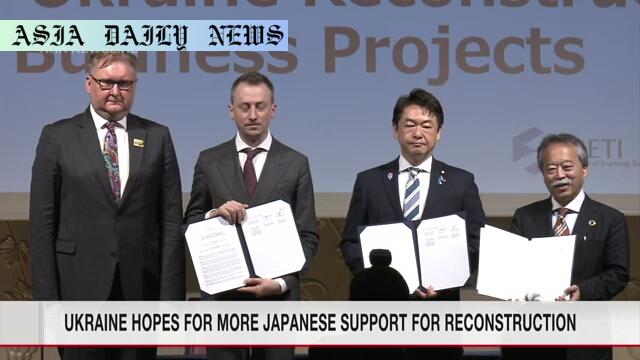Reconstruction: Ukraine and Japan laid significant plans for joint economic redevelopment, unveiling 29 new agreements at Tokyo’s forum.
Ukraine seeks Japan’s support for their economic reconstruction.
29 new cooperation documents were unveiled in Tokyo.
A decade-long reconstruction effort is anticipated to cost $524 billion.
The focus is on agriculture, debris removal, and investment attraction.

Introduction: A Path Toward Recovery
As Ukraine continues to navigate the challenges of recovery from the ongoing conflict, the need for international alliances has never been more pressing. At the forefront of these partnerships stands Japan, providing assistance and expertise to bolster Ukraine’s economic reconstruction. Deputy Prime Minister Taras Kachka, Foreign Minister Andrii Sybiha, and First Lady Olena Zelenska recently attended a pivotal forum in Tokyo, emphasizing the bilateral commitment to mutual growth and recovery. This event underscores the growing momentum in international efforts to address Ukraine’s rebuilding endeavors.
The Significance of the Tokyo Forum
The forum, held on Monday in Tokyo, brought together over 300 participants, including government officials and representatives from Japanese businesses, to address Ukraine’s reconstruction challenges. The discussions revolved around strengthening bilateral ties and finding synergies between Japanese capabilities and Ukrainian needs. During the forum, 29 new cooperation documents were unveiled, adding to the 80 agreements already signed. This brings mutual commitments into areas such as agriculture, debris management, and infrastructure redevelopment. These agreements serve as a testament to the active role Japan is playing in Ukraine’s journey toward recovery.
A Collaborative Vision for Reconstruction
With an estimated $524 billion required over the next decade for Ukraine’s full recovery, international collaboration is paramount. Japan’s unique strengths in areas like technology and efficient project execution are invaluable in crafting long-term recovery solutions. Alongside presenting existing projects, the Tokyo forum became an avenue to explore the potential of Japanese businesses investing in Ukraine’s agricultural expansion and environmental cleanup. Deputy Prime Minister Taras Kachka and other Ukrainian officials expressed heartfelt gratitude to Japan’s government and business sector for the consistent support extended so far.
Unveiling the Future: New Agreements and Investments
Among the 29 new agreements signed during the event, significant emphasis was placed on agricultural reform and debris removal. These initiatives are geared toward reclaiming farmland, enhancing food security, and ensuring infrastructure stability. Ukrainian officials also took this opportunity to invite private sector stakeholders to participate in development projects, making Japan a crucial partner in revitalizing the nation’s economy. Furthermore, Japan’s parliamentary vice-minister of economy, trade, and industry, Kato Akiyoshi, expressed Japan’s commitment to making this partnership tangible through impactful, real-world projects.
The Role of Diplomacy in Global Recovery
The relationship between Ukraine and Japan has broader implications for global collaboration in similar crises. It highlights how nations can pool resources to ensure economic recovery without undermining national sovereignty. With crises increasingly becoming global in scope, the Tokyo forum offers an optimistic template for international partnerships. It also underscores that rebuilding war-torn nations isn’t solely about financial investments; it’s about strengthening diplomatic relations, fostering innovation, and sharing expertise to ensure resilient, sustainable outcomes.
Looking Ahead: What Lies Next for Ukraine and Japan?
Beyond this forum, Ukraine’s continued engagement with international allies like Japan will be crucial in achieving its reconstruction goals. The visiting Ukrainian leaders, including First Lady Olena Zelenska, also used the trip to forge cultural and diplomatic ties by participating in global events like the World Expo in Osaka. This aligns with a broader vision of not just rebuilding Ukraine but positioning it as a global economic and cultural hub. Japan’s involvement signals a promising future of shared growth and expanded geopolitical partnerships.
Commentary
A Robust Partnership for a Resilient Recovery
The collaborative efforts between Ukraine and Japan reflect a masterful example of diplomacy underpinned by purpose. As Ukraine grapples with the devastating impacts of conflict and seeks to rebuild its shattered economy, strategic partnerships like the one forged at the Tokyo forum play a pivotal role. Japan’s willingness to engage through actionable projects demonstrates its commitment not only as an economic ally but also as a moral custodian of international peace and stability. By unveiling 29 new cooperation agreements, we witness the culmination of focused efforts geared toward joint progress.
Economic Reconstruction: Beyond Immediate Challenges
What stands out in this meeting is the depth with which Japan’s government and private sectors are contributing. Initiatives ranging from agricultural reform to debris removal showcase a comprehensive understanding of Ukraine’s recovery needs. However, these developments also raise critical questions about the role of local communities. How will these partnerships ensure that grassroots development is prioritized? It is imperative that Ukraine not only benefits nationally but also sees tangible improvements in the quality of life for its citizens, especially in impoverished regions.
Future Prospects: Rebuilding with a Global Vision
This dialogue between two nations paves the way for a new standard in global cooperation. Beyond the financial figures and agreements, what truly makes this effort historic is its potential to inspire other nations to follow suit. At a time when global crises are prevalent, the urgency for nations like Japan and Ukraine to show resilience cannot be overstated. Their collaboration serves as a powerful reminder that unity and shared vision can turn even the gravest challenges into platforms for transformative growth.


